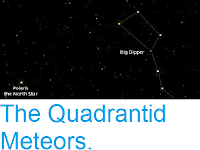The American Meteor Society has
received reports of a bright fireball meteor being seen over parts of
the the southwest United States slightly before 8.00 pm on Sunday 26 February local time (slightly before 3.00 am on Monday 27 February GMT). The majority of the reports came from the northern Texas, but sightings were also reported from Colorado, New Mexico, Kansas and Oklahoma. A fireball
is defined
as a meteor
(shooting star) brighter than the
planet Venus. These are typically caused by pieces of rock burning up in
the atmosphere, but can be the result of man-made space-junk burning up
on re-entry.
The 26 February 2017 Texas Fireball seen from Hawley in Texas. Kevin Palivec/American Meteor Society.
Objects of this size probably enter the Earth's atmosphere several times
a year, though unless they do so over populated areas they are unlikely
to be noticed. They are officially described as fireballs if they
produce a light brighter than the planet Venus. It is possible that this object will have produced meteorites that reached
the surface (an object visible in the sky is a meteor, a rock that falls
from the sky and can be physically held and examined is a meteorite).
Witness reports can help astronomers to understand these events. If you
witnessed this fireball you can report it to the American Meteor Society here.
See also...
Follow Sciency Thoughts on Facebook.







